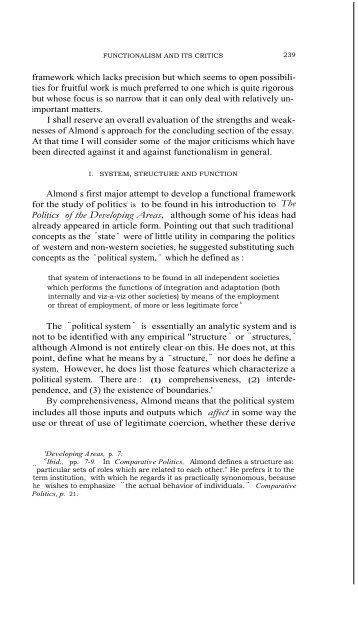FUNCTIONALISM AND ITS CRITICS - Intercollegiate Studies Institute
FUNCTIONALISM AND ITS CRITICS - Intercollegiate Studies Institute
FUNCTIONALISM AND ITS CRITICS - Intercollegiate Studies Institute
Create successful ePaper yourself
Turn your PDF publications into a flip-book with our unique Google optimized e-Paper software.
<strong>FUNCTIONALISM</strong> <strong>AND</strong> <strong>ITS</strong> <strong>CRITICS</strong><br />
framework which lacks precision but which seems to open possibilities<br />
for fruitful work is much preferred to one which is quite rigorous<br />
but whose focus is so narrow that it can only deal with relatively unimportant<br />
matters.<br />
I shall reserve an overall evaluation of the strengths and weaknesses<br />
of Almond ' s approach for the concluding section of the essay.<br />
At that time I will consider some of the major criticisms which have<br />
been directed against it and against functionalism in general.<br />
I. SYSTEM, STRUCTURE <strong>AND</strong> FUNCTION<br />
Almond ' s first major attempt to develop a functional framework<br />
for the study of politics is to be found in his introduction to The<br />
Politics of the Developing Areas, although some of his ideas had<br />
already appeared in article form. Pointing out that such traditional<br />
concepts as the " state " were of little utility in comparing the politics<br />
of western and non-western societies, he suggested substituting such<br />
concepts as the " political system, " which he defined as :<br />
that system of interactions to be found in all independent societies<br />
which performs the functions of integration and adaptation (both<br />
internally and viz-a-viz other societies) by means of the employment<br />
or threat of employment, of more or less legitimate force s<br />
The " political system " is essentially an analytic system and is<br />
not to be identified with any empirical "structure " or " structures, "<br />
although Almond is not entirely clear on this. He does not, at this<br />
point, define what he means by a " structure, " nor does he define a<br />
system. However, he does list those features which characterize a<br />
political system. There are : (I) comprehensiveness, (2) interdependence,<br />
and (3) the existence of boundaries.'<br />
By comprehensiveness, Almond means that the political system<br />
includes all those inputs and outputs which affect in some way the<br />
use or threat of use of legitimate coercion, whether these derive<br />
'Developing Areas, p. 7.<br />
e lbid., pp. 7-9. In Comparative Politics, Almond defines a structure as:<br />
" particular sets of roles which are related to each other." He prefers it to the<br />
term institution, with which he regards it as practically synonomous, because<br />
he wishes to emphasize " the actual behavior of individuals. " Comparative<br />
Politics, p. 21.<br />
239
















